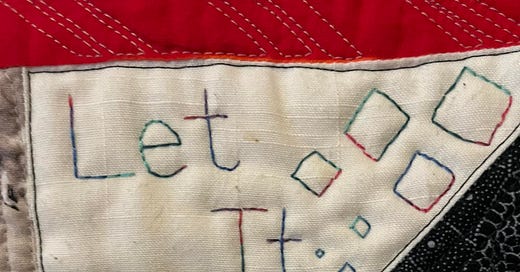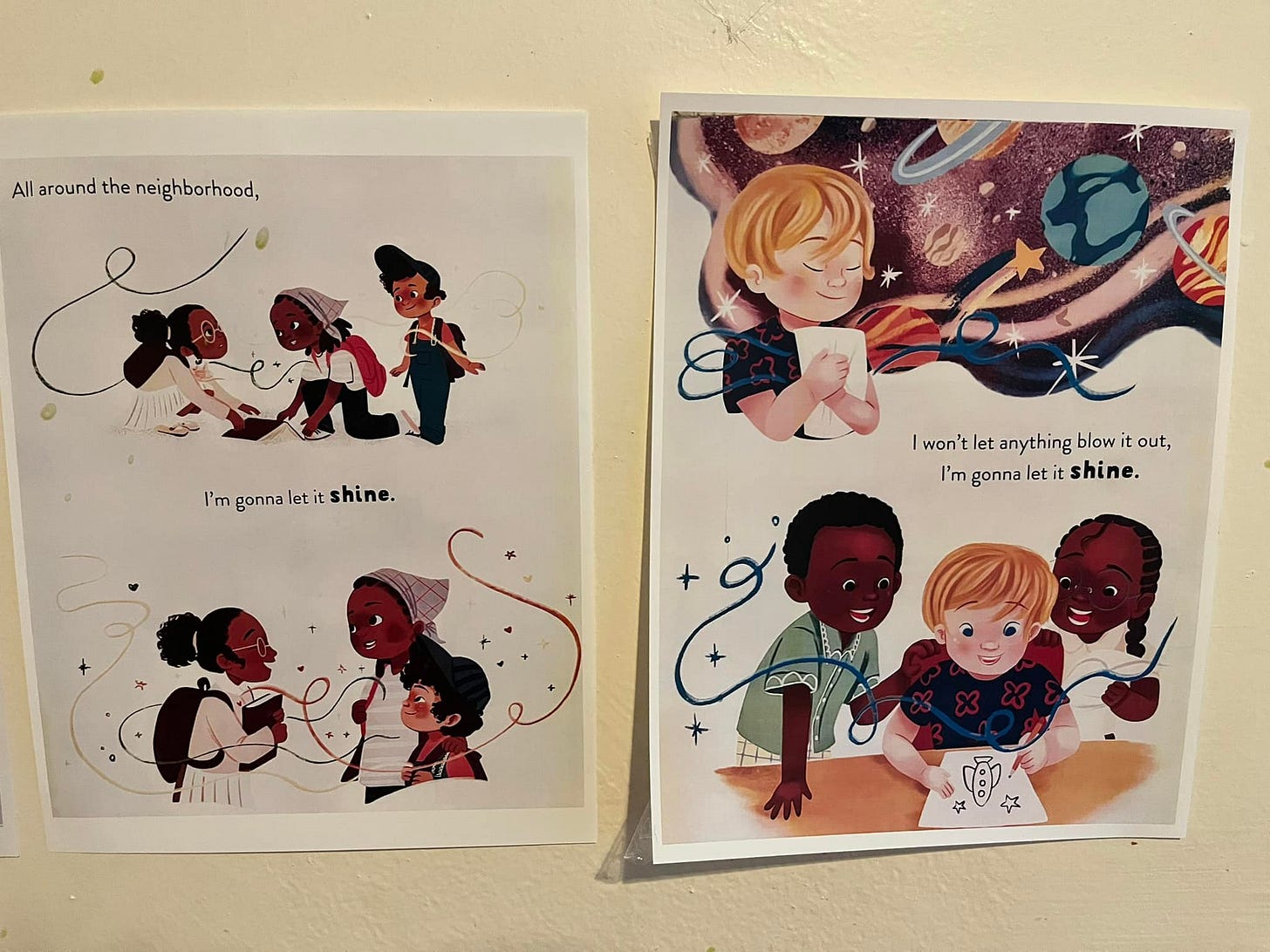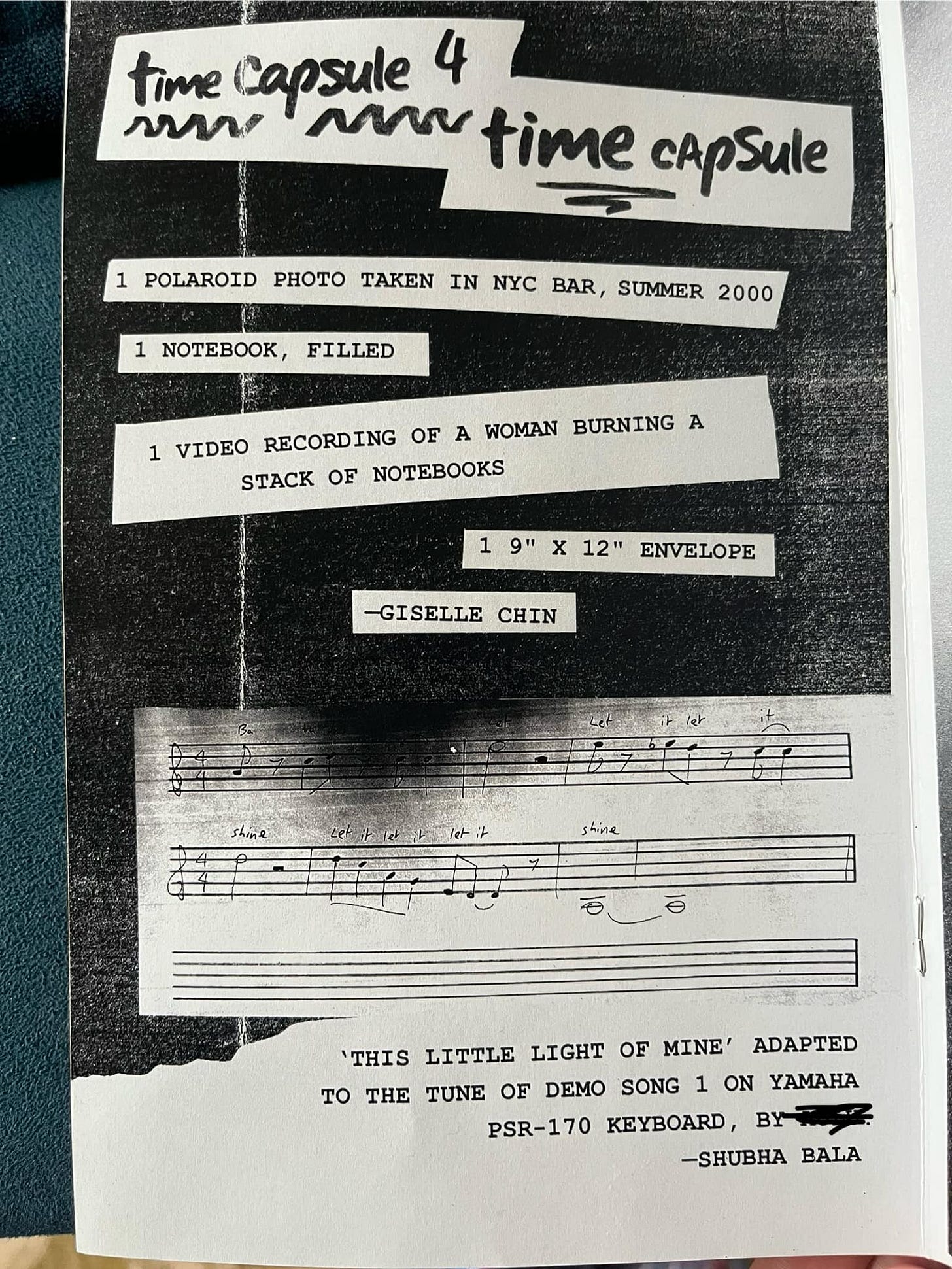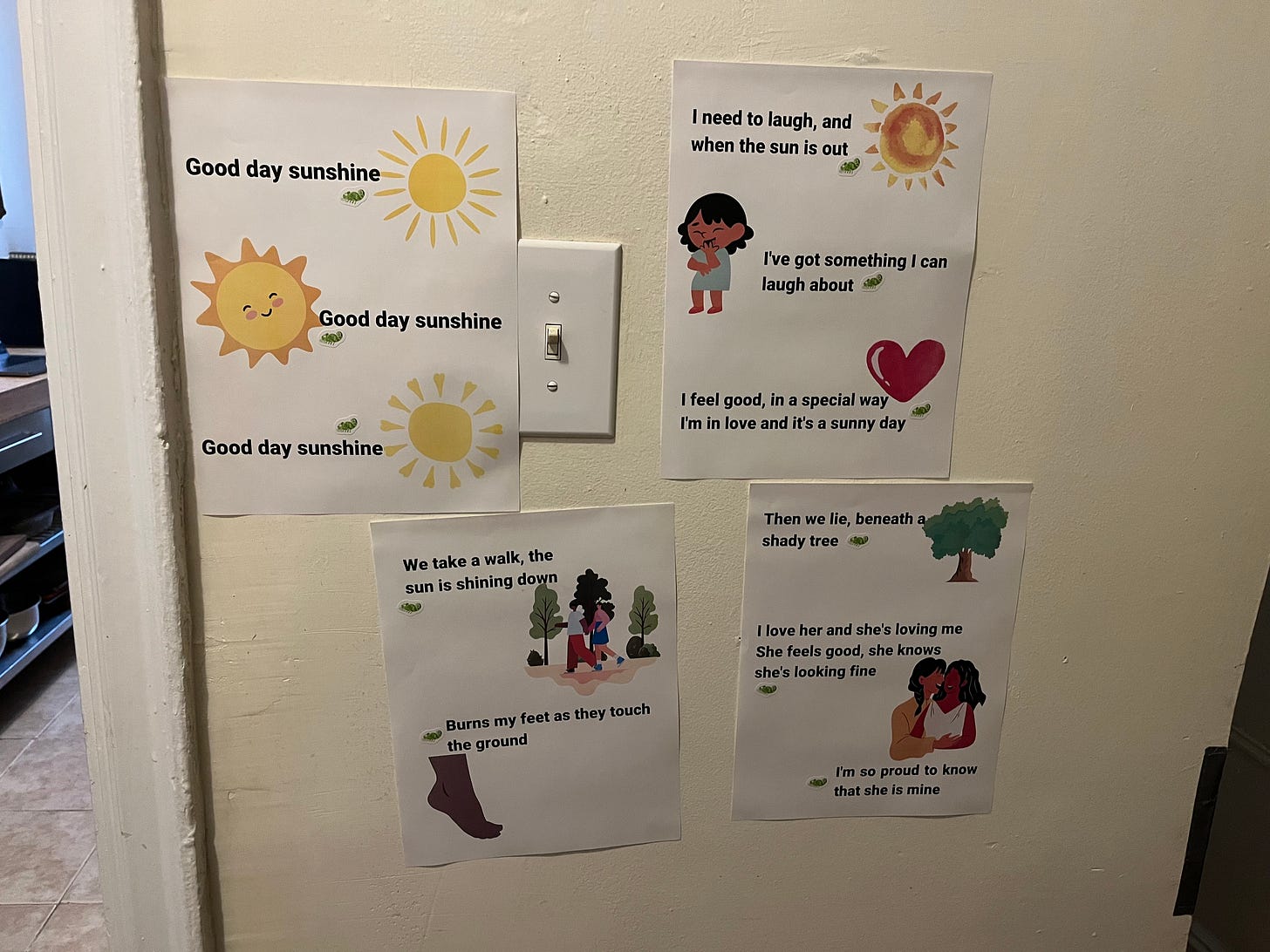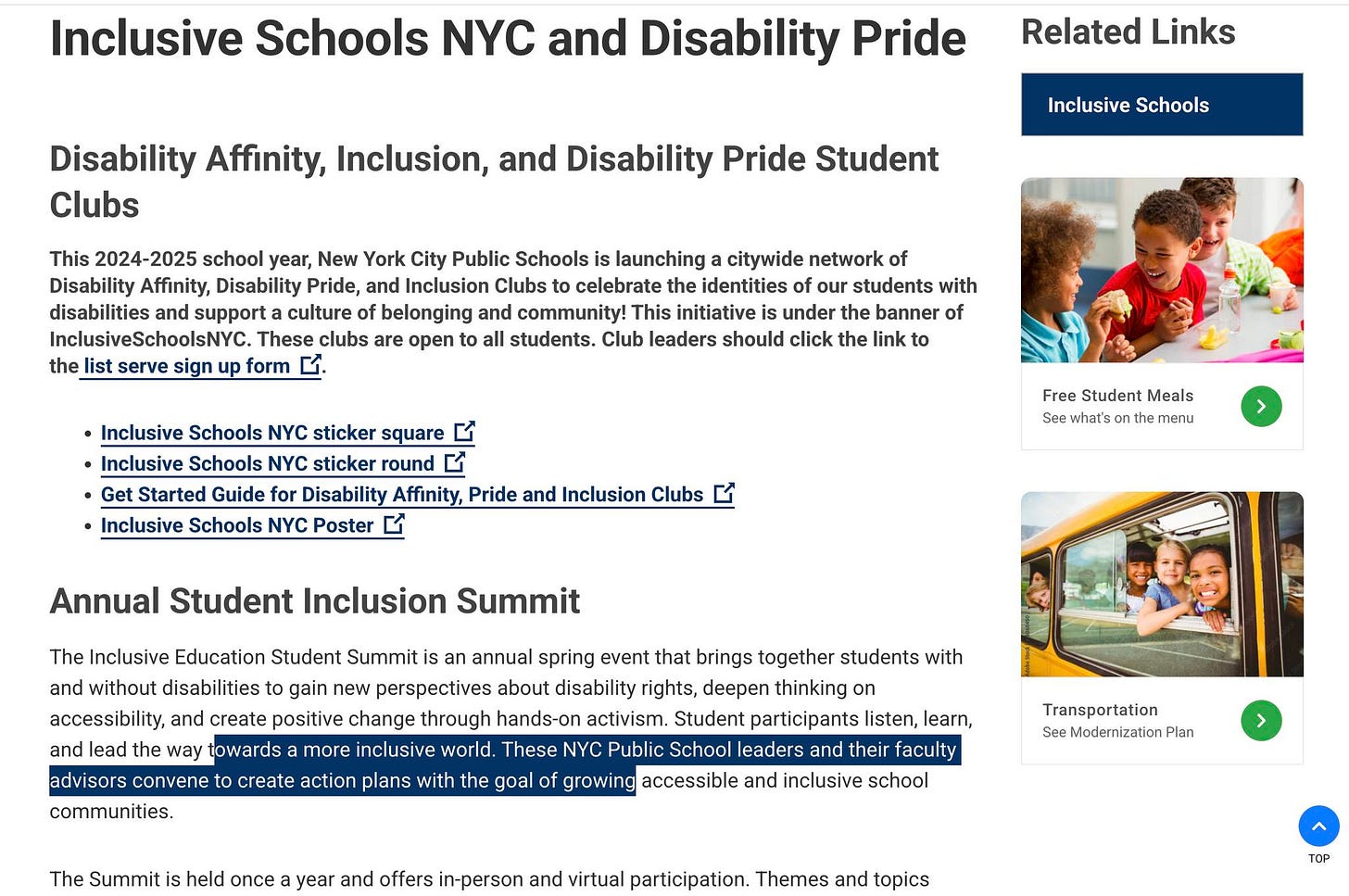On the long, slow, evolution of "shine"
and BUILDing while we block, performative inclusion in NYC, Plain Language as politics, FUN, and empathy for parents drawn to 'profound autism' (even though it's harmful)
In this newsletter…
The performative inclusion of the New York City schools (Feb 8)
Empathy for parents drawn to the label ‘profound autism’, even though it’s harmful (Feb 12) - aka, center the most marginalized for liberation
The Dept of Ed - let’s build while we block (Feb 5)
Is there a way to make sure this moment with the decimation of the DOE is used not just to block - not just to try to prevent losing the gains we’ve made in the past decades - but also to build. To acknowledge that what we had wasn’t working anyway. That it worked for a handful of white disabled kids but that’s about it.
How do we make sure this moment includes visioning what we actually want - not just to put out the fire but to build something better than what we had before.
Can we make sure that right now we’re also learning from those who by choice or by force, have already been creating what we want - or already did so hundreds of years ago. Have already been working from a totally new paradigm. Have already seen and experienced the cracks and holes and missing walls - to help set a North Star that isn’t just plugging those holes but is the education all our kids actually deserve?
Let’s make sure we aren’t just blocking, but we’re building too.
On the long, slow, evolution of “shine” (Feb 8)
When A- was a tiny baby, This Little Light of Mine quickly made it into his playlist. At first it was the Soweto Gospel Choir version, and eventually the Raffi version got added on.
When Raffi sings “I won’t let anyone blow it out, I’m gonna let it shine”, it always makes me cry.
By the time A- was a couple of years old, we got sick of always having to change the music on Spotify for him (remember he’s non speaking so it was an effort each time to figure out what he was trying to change it to). So we got him his own phone and locked it down the Spotify so he could DJ. Which often meant listening to the same song on repeat - or the same section of a song - for weeks. This Little Light of Mine featured prominently in his DJ career.
”Let it shine” and “Shine” were some of the first words we understood that A- said. For a couple of years (and maybe still?) A- would have joy gestalts. That is - a word or short phrase that he screams with joy that means “life is amazing!!!” or something along those lines. For a long time it was “purple!!!!” And then for a long time it was “let it shine!!!!”, often shouted while jumping on a trampoline with a huge smile at us.
Especially throughout his 5th year of life.
Which I know, because “Let it Shine” made it onto his quilt for his 5th birthday. Every year for his birthday, we embroider 2 triangles with the lyrics from songs that were meaningful to him over his last year of life. (There are exactly the right amount that when he’s 18 years old his whole quilt will be filled with lyrics from his childhood.)
The past few months, one of A-s favorite things to do is run up to his quilt and tap “shine” and then once we all say “shine” he’ll run around the room with excitement and do it again. He’s done it so much that you can see how dirty that part of the quilt is from all the touching. :)
I printed out pages from a library book version of This Little Light of Mine and put them on the opposite wall of the quilt. He’ll run back and forth tapping “shine” on both sides of the room, sometimes interrupting the pattern to tap “neighborhood”.
One day A- got really into a demo song on a Yamaha electronic keyboard. He’d play the same part over and over. So we started singing “let it shine” to that tune. It would go “letttt let it let it let it shiiiine” and then THAT was his favorite for months and months. My friend Lisa Ko (author of the Leavers and Memory Piece) created a time capsule zine for the release of Memory Piece and asked us to contribute. So we made a sheet music version of the new Let it Shine song which made it into her zine for all the first buyers of Memory Piece.
About a year ago, as part of our self-directed pre literacy learning, we made a Pictello with compound words, which I’m told is the beginning of breaking down sentences to words, to syllables, to letters. We wrote up lots of compound words that were meaningful to him, and made a Sesame Street style video that shows how these long words break down into 2 little words.
“Sunshine”. “Sun”. “Shine”.
A- loves that part of the Pictello. I also made one with words that sound like Shine, another favorite Pictello.
Over the past months A- has been into written words - recognizing words, tapping on them with excitement, saying them sometimes. But, especially at the beginning, he wasn’t able to focus to engage with anything we wrote and it mostly showed up with bus signs and street signs.
But, he’s also into watching his battery-powered trains. So I bought a set of alphabet “trains” so that his battery-powered engine could pull words around the track. The very first word I made was “Shine”. He looked up from his swing and YouTube and watched the train, pulled the smoothie out of his mouth and said “Shine!!!!”
A couple of months ago I made a Spotify playlist with every song I could find with the word “shine”. The one he loves is Good Day Sunshine.
He opens the Spotify lyrics and clicks all around, learning the words and replaying the parts he feels most like listening to right then.
I printed out the lyrics to Good Day Sunshine and put them up in the hallway. I used chameleon reader so that if you tap the sticker with the special pen, it plays those lyrics. The other day he was listening to Good Day Sunshine on his phone, and ran to the hallway and pushed the special pen into my hand (he can’t do it himself). He moved my arm to the lyric he wanted me to tap. He started finding the parts of the song on Spotify, and then having me tap the same part on the printed out lyrics.
Last night he was playing Good Day Sunshine, and singing “Sunshine!” “Shine!” “Sun!” Then he sang “Let it shine!”
The performative inclusion of the New York City schools (Feb 8)
Woooooow. I just found out that New York City Public Schools has an "Inclusive Schools" initiative which is ... creating clubs to celebrate belonging. It is NOT .... trying to actually create inclusive schools. It is NOT examining segregation of disabled kids, or why we have a reputation as being one of the most segregated cities, or why we disproportionately segregate Black kids for emotional disturbance classifications but also disproportionately give white kids IEPs and support them but don't segregate them.
It's.... making clubs. Oh and a glossary of inclusive words!!! And an art contest! It's performative allyship at it's finest!
Hey, who needs actual inclusion when you can get a sticker instead. Meanwhile, I'm in a group chat where a parent is asking what to do about a bus driver yelling at her non-speaking kid who has to get bussed to whatever segregated placement was deemed the best option for her. I've got parents still yelling at me that inclusion is too hard and that segregation is best for my kid. And I think that one family who's kiddo who uses a wheelchair but the DOE keeps assigning her a school on the 3rd floor of a non-elevator building has given up. But I hope that kid makes a nice poster!
A political action: learn Plain Language (Feb 10)
Check out this guide called "Plain Language for Arts Organizations".
I feel like a really political thing people could do right now, especially those who can't go out and join coalitions, is immerse themselves in plain language. Plain language is a way to make documents accessible to those with IDD (and therefore, many others benefit as well!).
It's political because without plain language, we are keeping entire swaths of people out of discourse - like political discourse. And THAT is political for obvious reasons - these are folks who were already invisiblized and seen as disposable, but now they are even moreso.
You can use plain language for anything! Newspaper articles, policy documents, websites, a fun guide on how to become a busfanner!
The Autistic Self Advocacy Network (ASAN) and New Disabled South are 2 orgs I know who seem to be at the forefront of ensuring that policies and other political documents are accessible via plain language.
ASAN also has a guide to create Easy Read, which is a format for intellectually disabled folks to easily access information, and I’m told it’s easy to turn something into Plain Language once you’ve made it Easy Read.
I am A-. I am fun! (Feb 11)
I just realized that I think A- taps on the “I am A-. I am fun.” poster in the hallway right before he makes us play “ready set go”.
(He has a few such posters in the hallway like I am amazing. And I am love.)
Empathy for parents drawn to the harmful label, profound autism (Feb 12)
Something I find hard to write about is autism labels, or "profound autism", because I absolutely listen to non-speaking autistic people and understand and believe that these labels are incredibly harmful to them, and I hold empathy for the parents (and some non-speaking autistic folks!) who hold these labels near and dear.
Unfortunately for all of us, autistic and other disabled advocates who have really done the work on understanding and holding the life experience of the most marginalized, get watered down by social media autistic folks who share memes like "autism's like a slider!" and "you either are or you aren't!". People who have never actually created a social circle for themselves that includes folks like A-, but feel incredibly confident sharing a meme that says "heavy work!", "AAC!" and then proceed to shame parents who are genuinely seeking help, and for whom these memes are meaningless. I once had the privilege of speaking to Terra Vance who affirmed for me, these people actively do harm. Just the other day I was in a group asking about ways I can celebrate Daniel, and one parent started telling me how if we feel "alone in what we're doing", then we CLEARLY aren't taking advantage of head start and OT and play therapy. ......
If you are one of those parents genuinely seeking help and advice, and are being met with ridicule and hatred and condescension by people who've never even taken the time to broaden their understanding of the autistic experience to include folks with high support needs, and then another group of parents - ones who use terms like 'profound' - says "Come! I see you! I get you! I get your kid!", then of course you will gratefully glom onto that community you have been seeking. The one who (on the surface, at least), sees you and your kid.
I'm reminded of this because recently I asked a very small group of friends for advice. In doing so, I thought to myself "this isn't something many parents, even parents to autistic kids, think about".
The question was, would A-'s survival be more likely if we moved to a small town? Daniel and I will die one day. And I know that our systems for living in community aren't awesome (both in the US and in Canada), and are set to get worse. Every time I encounter a Black unhoused person who may be speaking or moving their bodies in different ways in my own neighborhood, I think about A-. When A- is an adult, towering over people, in his Black potentially dyspraxic, non-speaking body. Where will people be less likely to incarcerate him? To be threatened by him? To end his life? If he's outside without a support person? In a big city with progressive people but where he's simply a statistic? Or a small town where people at least know who he is?
This isn't about seeking a place where people aren't ableist and racist. This is about seeking a place where people at least *know* him enough to treat him as a person, in the absence of inclusion through his schooling years. So that if his body or speech looks different from theirs, people say "Ahhhh, that's just A-!" and help him get back home.
I'm really, really lucky that I've found a community of parents of kids like A-, who can meet this question with the nuance, grace, and reality that it deserves, AND who are ND-affirming and don't use terms like "profound". But I can also see how easy it would be to be so frustrated by a bunch of people summarizing dehumanization and survival to just being about stimming in public, that when you find a community of parents who are asking the same questions (even if they are, inadvertently, dehumanizing your kid in another way), you say "YES. FINALLY people who get it!".
* * * * * *
To clarify - this isn’t about people just seeing my kid or acknowledging he exists. This isn’t about having the profile of one non speaker when you share 8 profiles of autism. This is about centering, not just naming, the most marginalized people. About getting that if you center them in your efforts we are all liberated. If you simple acknowledge them then you’re only liberating yourself (or thinking you are). If we created / fought for a world where we don’t have to move to a small town just to increase the chances of my kiddo’s survival, I guarantee you every single one of us would be living a more liberated life.
Stuff I’m reading and listening to
I love M. Gessen, and I loved this article about how we may unintentionally support authoritarianism. It resonated with me, because they describe things I’ve been thinking - I could see how easily I could, with well-intentions, support authoritarianism.
This article is amazing. A disabled parent raising a kid with their same disability, reflecting on ableism and parenting from two perspectives.
As someone new to the disability communities, I had naively thought this push to make someone “more normal” was exclusive to kids who are neurodivergent, and surely not for kids with physical disabilities.
Two great articles by the Anti-Authoritarian playbook. The first is a great quick run-down of some buzzwords you may be hearing all the time, and if you’re like me who had an engineering background you don’t know what they really mean :). The second is a really, really good summary of how we work across “party lines” towards a common goal of taking down authoritarianism.
This is the last post I'll share about the Telepathy Tapes podcast, by Typer Tremblings. I’ll add, that this isn’t really just about Telepathy Tapes. It’s about how we unintentionally box in non-speakers and the real harm it does. It made me realize that my references to A- as a poet are harmful to him, unless he can take that label himself. Please read it.

